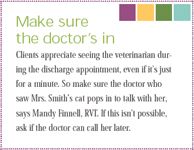6 steps for easy discharges
Curb the 5 o'clock chaos with these simple steps to streamline your discharge appointments and send clients away happy.
On Friday afternoon, the practice's lobby bustles with clients eager to pick up their Fluffys and Spots before the weekend. Phones are ringing, dogs are barking, and Mr. Jones, Mrs. Smith, and Ms. Brown arrive at a quarter after 5 to reunite with their furry companions.

Mr. Jones pays for Rover's neuter—and then decides he also needs pet food and a new collar. Sure, you'll draw up another bill for him. Mrs. Smith needs to know how to give Snowball her insulin injections; you find a technician to demonstrate the procedure on the tabby. Ms. Brown asks for help hoisting her Labrador—whose fractured leg is now on the mend—into her sport utility vehicle; you're alongside her in the parking lot, making sure Max doesn't try to leap into the backseat.
Without a plan, end-of-the-day visits from clients can wreak havoc on your carefully planned schedule. Use these six steps to smooth the pick-up process and prevent backups.
1. Try some teamwork
Good communication helps you avoid most missteps. When your team is on the same page, the day just runs more smoothly, says Carrie Gaffney, a veterinary assistant at Rock Road Animal Hospital in St. Louis. Don't be the receptionist who needs to call the manager to settle a payment discrepancy or the technician who doesn't know the payment protocol. One stumble may mean Mrs. Smith waits an extra 30 minutes for discharge instructions—that's a half-hour for her to contemplate taking Snowball, her pampered Persian, to the practice down the road.
Getting your whole team on board also means making sure everyone knows the diets and products you recommend. "Cross training keeps you from having to get someone else for every little thing," says Mandy Finnell, RVT, a Firstline Editorial Advisory Board member and a technician at Cherokee Animal Clinic in Overland Park, Kan. And empowered team members who can answer clients' questions free up the doctors' time.

Safety tip
To prepare to answer clients' sometimes tricky queries, the team at Cherokee Animal Clinic plans fun continuing education sessions. During regular lunch meetings, Finnell says team members talk about the week's good and bad experiences and how they can improve their practice. They also examine specific issues such as purebred dog predispositions and the importance of recommending blood work.
2. Prepare for the pickup
It's the Boy Scouts' motto, and it should be yours too: "Be prepared." "A little bit of planning goes a long way," says Pamela Stevenson, CVPM, a practice management consultant with Veterinary Results Management Inc. in Durham, N.C.
If you know Mr. Johnson plans to pick up Fido at 3 p.m., plan ahead and update the invoice, fill the prescriptions, collect and wash Fido's stuffed animal and blanket, and remove Fido's catheter. In fact, a receptionist at Cherokee Animal Clinic reviews the morning's files each afternoon—grooming appointments, surgeries, dental procedures—and prepares food, medication, exams, report cards, and charges before scheduling discharge times with clients. (Also see "Forecast: Schedule Disrupters on the Horizon," Pearls of Practice.)

Make sure the doctor's in
3. Schedule discharge appointments
Scheduling appointments or ball-parking times for pet pick-ups can also help eliminate the evening bottleneck. Stevenson recommends choosing specific times for appointments, such as 10 minutes after the hour. If clients arrive early, she says, try to get them in on time, and if they're late, they won't be as upset if they need to wait 20 minutes to checkout.
Paige Phillips, a Firstline Editorial Advisory Board member and the director of nursing at the Veterinary Specialty Hospital of the Carolinas in Cary, N.C., says her practice doesn't schedule discharges, but team members ask clients when they plan to pick up their pets. She says this helps team members prepare and gives everyone a little flexibility.
What happens when all of your clients walk through your door at the same time? Treat them based on their dismissal situation, Stevenson says. Animals headed for an emergency hospital or pets with life-threatening diseases go first; the rest follow by their original appointment times.
4. Save Fido for last
When the client arrives, go to a private place in the practice to review discharge instructions, including medications, diet, and home care. Rock Road Animal Hospital has a separate room for discharges. "That way, I don't have to worry about taking one of the outpatient rooms away," Gaffney says. If you use exam rooms for discharges and they're full, Stevenson suggests finding a quiet section of the lobby.
But the reunion shouldn't happen too soon—not until after you update the client. Otherwise, pets may distract their owners. "You won't have their undivided attention," Finnell says. Clients are also more likely to ask excessive questions if they see their pet's bandages before you explain the procedures, their pet's current condition, and discharge instructions.
The exception: Sometimes you'll need to demonstrate how to give a new medication. So if Mrs. Smith needs to give Snowball insulin injections, you'll need to bring her cat in and show her how. But save this demonstration for last, so her attention is on your home-care instructions instead of on her joyful reunion with Snowball.
5. Give written instructions
It's not enough to say it; you need to write it, too. Consider including in your discharge instructions a list of do's and don'ts, wellness care recommendations, medication, dietary requirements, and lab reports. You'll ask clients to sign a copy of the discharge papers before they leave, Stevenson says. But this takes time. That's why client service representatives at the Veterinary Specialty Hospital of the Carolinas hand clients a copy to read before they're taken to an exam room. Phillips says this gives clients a chance to think of questions before seeing a nurse.
You can also plan a predischarge appointment on the phone to discuss the directions or send a copy of the discharge instructions to clients through e-mail or fax, Stevenson says. When owners pick up their pets, they can meet with a team member and sign the discharge instructions they received earlier.
6. Make it easy to pay
It's up to you: Clients can pay before or after their appointment. At Rock Road Animal Hospital, clients pay first. That way, Gaffney says, clients never need to juggle their credit card receipt and their pet at once.
But at Cherokee Animal Clinic, clients pay at the end of the visit. After all, Mr. Jones may want a new diet for Rover after hearing your recommendations and he might not be too keen on writing another check. But he still doesn't reunite with Rover until after he's finished paying. An intercom system alerts team members when it's time to release the patient.
Money talks can also stall out your schedule if you haven't prepared clients for the bill. You can prevent some of the disagreements that crop up when you ask clients to pay with a few simple payment guidelines. Stevenson recommends requesting a deposit for new clients who request expensive procedures. Depending on the practice, you may require a $250 or $500 deposit or full payment. Finnell suggests presenting a written estimate before you offer your services. If the pet needs additional treatment, update your clients, get the verbal OK, and document their permission in the patient's file.
For a bustling practice, you may consider an authorized payment program for regular clients, Stevenson says. How it works: Clients complete a form submitting their credit card information and authorizing a maximum charge without prior approval and a date range for charges—usually one year. When they arrive to pick up their pets, they skip the cashier. A receptionist mails a copy of the invoice and credit card slip to the home the same day.
Your days don't need to end on a roar or a whimper. With a little preparation, your practice can run like clockwork and you can stay on schedule—and meet all of your clients' last-minute requests—as the day winds down.
Kelli Conkey is a freelance writer in Evanston, Ill. Please send questions or comments to firstline@advanstar.com